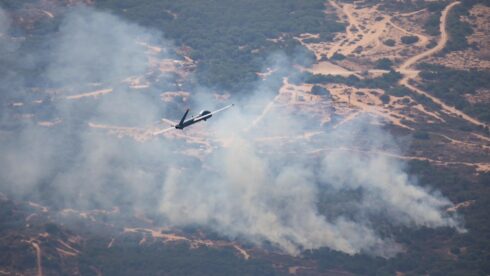An official of Hezbollah was killed on April 18 when an Israeli drone strike hit his vehicle on a road between the city of Sidon and the town of Ghaziyeh in southern Lebanon.
In a statement claiming responsibility for the strike, the Israeli Defense Forces (IDF) said that the slain official, Muhammad Abdullah, was responsible for the deployment of Hezbollah’s communication systems across Lebanon, especially in areas south of the Litani River.
“The activities of the terrorists in the recent period constitute a violation of the understandings between Israel and Lebanon and posed a threat to the State of Israel and its citizens,” the military added.
The deadly strike was the most recent in a series of operations that the IDF began conducting against Hezbollah past February 18, when all clashes on the Israeli-Lebanese border were supposed to end according to a ceasefire brokered by the United States last November.
Israel has so far justified these operations as a necessity to counter direct threats to its security. It has also refused to completely withdraw from southern Lebanon as called for by the ceasefire agreement, keeping troops at five strategic posts there.
From its side, Hezbollah, which took heavy losses during the last confrontation with the IDF, has not yet responded in any way.
Faced with unprecedented internal pressure, the group has been prioritizing diplomacy, while holding onto its main principles.
A Hezbollah official said on April 18 that the group categorically refused to discuss handing over its weapons to the Lebanese military, one of the main demands of Israel and the U.S., unless Israel withdraws completely from southern Lebanon and stops its “aggression.”
“It is not a question of disarming,” Wafiq Safa said in an interview with Hezbollah’s Al-Nur radio station. “What the president [Joseph Aoun] said in his inauguration speech is a defensive strategy.”
Safa added that Hezbollah had conveyed its position to Aoun, who earlier in the week said he sought “to make 2025 the year of restricting arms to the state” alone.
In his interview, Safa asked: “Wouldn’t it be logical for Israel to first withdraw, then release the prisoners, then cease its aggression… and then we discuss a defensive strategy?”
“The defensive strategy is about thinking about how to protect Lebanon, not preparing for the party to hand over its weapons,” he noted.
While Hezbollah appears to be betting on diplomacy, Israel can’t be trusted to be fair. It is highly possible that Israel could soon renew full-on military operations in Lebanon, including on the ground, under some pretext to further pressure the group.
_______________________________________________________________________________________________________________________
SouthFront: Analysis and Intelligence
NOW hosted at southfront.press
Previously, SouthFront: Analysis and Intelligence was at southfront.org.
The .org domain name had been blocked by the US (NATO) (https://southfront.press/southfront-org-blocked-by-u-s-controlled-global-internet-supervisor/) globally, outlawed and without any explanation
Back before that, from 2013 to 2015, SouthFront: Analysis and Intelligence was at southfront.com







some ceasefire… any particular reason why hizballah is holding to their end of the deal?
zionists to the south; lebanese army to the north; salafists to the east and nato ships to the west. not exactly ideal.
hezbollah will have to step up their game and put a hefty bounty on netayahu’s head. time to decimate the warcriminals presently living in or on a land they have stolen, palestine. the jews must be evicted now!
the slain commander was responsible for ‘deployment of communications systems across lebanon, including south of the litani’. that would include incorporating these pagers. the beirut government is actively undermining hezbollah. too many killings, one after another, to consider it coincidence. can’t blame this soully on ‘by stealth and deception’ plague rats.
do zionists know the term ‘ceasefire’?
the jews know that they can breach any law any agreement with impunityy since the americ*nts serve as theit backstop! look at the houthis, persecuted by the c*nts with bombs and missiles and what for attacking the jews and their endlösung of the jewish concentration camp gaza!
the joo is incapable of keeping any promise. it is the epitome of deceit. it screams in pain as it rapes your children.
we want more dead idf thugs please. burn them baby killing diper head trannies.
“the axis of resistance”…bwaha-bwaha-bwahahahahahaaaaa!!!